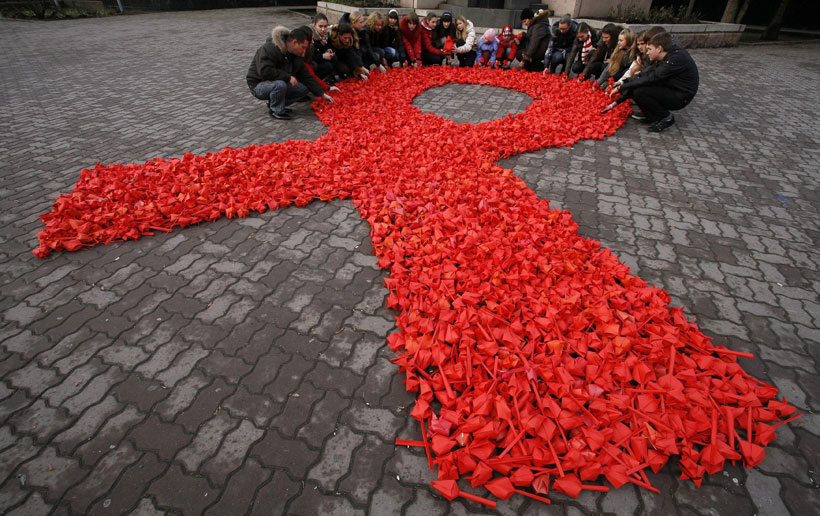Cole, Kemeny and Taylor (1997)
 The following study by Cole, Kemeny & Taylor (1997) is a study of the role of Social Identity Theory on the long-term health of gay men infected with HIV. The study is a good study of the Social Identity Theory, as well as the role of social factors in health - particularly with regard to sexually transmitted diseases.
The following study by Cole, Kemeny & Taylor (1997) is a study of the role of Social Identity Theory on the long-term health of gay men infected with HIV. The study is a good study of the Social Identity Theory, as well as the role of social factors in health - particularly with regard to sexually transmitted diseases.
LGBTQ individuals are a minority group that is different from most other minority groups, in that members of this group are defined by a characteristic which they most likely do not share with other members of their family. While for most people, the family is the most basic unit of support and belonging, many young LGBTQ students experience rejection from members of their family.
In the 1980's, the AIDS epidemic led to the "outing" of many gay men who had been hiding their sexuality from their families in order to avoid such rejection. When they were outed, some were rejected; some, in spite of their greatest fears, found that their families were supportive and loving. Taking advantage of this huge societal phenomenon, psychologists wanted to see if rejection by one's in-group would affect the mental and physical health of gay men.
One such study was carried out by Hayes, Turner and Coates (1992). They wanted to see if there was a correlation between having social support from an "in-group", depression and HIV related symptoms. In their study of 508 gay men living with HIV, they found that having a group to which they belonged was a key factor in not developing depression over the one-year period of the study. Those that did not develop depression, in turn, were less likely to develop full-blown AIDS. In this study, although the men found family support important, it was having an in-group of other gay men that was most important. This may be because they could speak more openly about their illness and felt that others in this group were better informed about it.
The aim of the study was to see if HIV might progress more rapidly in gay men who were sensitive to social rejection. In other words, if the men experienced feelings of being in an out-group that impacted their self-esteem, would they be more likely to develop full-blown AIDS more quickly than other infected men?
The study was a nine-year prospective study of 72 initially healthy HIV infected gay men. The sample was taken from a larger sample of well-educated, affluent, and largely White participants in a long-term biomedical study conducted in an urban west-coast setting.
In order to determine the men’s level of rejection sensitivity, they were given the "Social Situations Scale test." The questionnaire asks gay male respondents to consider their level of anxiety in a variety of social situations in which their homosexuality might be known to others. Those with high “rejection sensitivity” scored high on both “family-friend” questions (e.g., attending a family function with a partner) and “stranger-public” questions (getting a motel room for yourself and your partner.)
Every six months, blood was drawn and the lymphocyte count was taken. Interviews were also done with each participant to determine if any other factors may have played a role in a change in health. This included discussions of exercise, diet, changes at work or among friendship circles and sexual activity.
The researchers found that HIV infection progressed more rapidly in gay men who were particularly sensitive to rejection by unfamiliar others. These differences were significant - with gay men at the 75th percentile of rejection suffering AIDS onset and HIV-related mortality roughly 2 years earlier than gay men at the 25th percentile
Gay men who were particularly sensitive to rejection by unfamiliar others (stranger-public) were also significantly more likely to conceal their homosexual identity. And interestingly, concealing homosexuality reduced the progression of the disease.
The study was longitudinal in nature - being able to observe change over time. It was also a prospective study - measuring the participants' sense of rejection from their in-group before the virus developed into full-blown AIDS.
There was a sampling bias in that all of the men were from well-educated and affluent families. In addition, most of the participants were white Americans. It would be difficult to generalize the findings to other cultures. Socioeconomic class may also play a role in the findings.
Although these data suggest that sensitivity to social rejection may relate to the rate of HIV progression, they do not provide any information on the physiologic mechanisms linking these two variables.

 IB Docs (2) Team
IB Docs (2) Team
